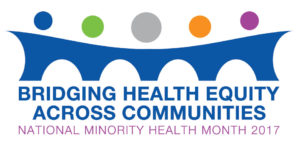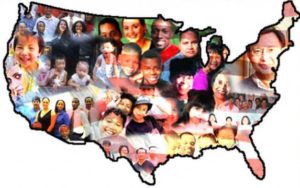 April is when we acknowledge National Minority Health Month and recognize the importance of achieving a nation free of disparities in health and health care. According to the U.S. Department of Health and Human Services Office of Minority Health, understanding the factors upon which better health is built – the conditions in which people are born, grow, work, live and age – underscores our goal in building stronger relationships and alliances that achieve better health outcomes for all communities.
April is when we acknowledge National Minority Health Month and recognize the importance of achieving a nation free of disparities in health and health care. According to the U.S. Department of Health and Human Services Office of Minority Health, understanding the factors upon which better health is built – the conditions in which people are born, grow, work, live and age – underscores our goal in building stronger relationships and alliances that achieve better health outcomes for all communities.
Community-based action that focuses not only on health status but also a particular type of health difference closely linked to social, economic, and environmental disadvantages, is central to the work of health advocates.
Barriers to good health go well beyond the health system and include places where we live and work, and where our children learn and play.
The need to accelerate our efforts in innovative approaches to improve minority health remains evident by the persistent gaps in health and health care  across communities of color, consequently leading to poorer health outcomes. Reducing barriers in health means working to address poverty, low educational attainment, and dangerous and unhealthy housing. Because racial and ethnic minorities are less likely to get the preventive care they need to stay healthy and more likely to face poorer health outcomes, direct action resulting in improvements in our communities can affect the health of generations.
across communities of color, consequently leading to poorer health outcomes. Reducing barriers in health means working to address poverty, low educational attainment, and dangerous and unhealthy housing. Because racial and ethnic minorities are less likely to get the preventive care they need to stay healthy and more likely to face poorer health outcomes, direct action resulting in improvements in our communities can affect the health of generations.
 From fresh food, safe playgrounds and recreational areas, to walkable neighborhoods, the keys to good health are all around us. Community organizations and public-private partnerships play an important role in helping improve opportunities for all Americans to reach their full potential for good health and success.
From fresh food, safe playgrounds and recreational areas, to walkable neighborhoods, the keys to good health are all around us. Community organizations and public-private partnerships play an important role in helping improve opportunities for all Americans to reach their full potential for good health and success.
The U.S. Department of Health and Human Services (HHS) Action Plan to Reduce Racial and Ethnic Health Disparities outlines goals and actions the Department is taking to reduce health disparities among racial and ethnic minorities. During National Minority Health Month, the Office of Minority Health will highlight the work of individuals, organizations, healthcare professionals, and advocates in communities across the nation to address these health gaps, with the goal of creating a nation free of disparities in health and health care.